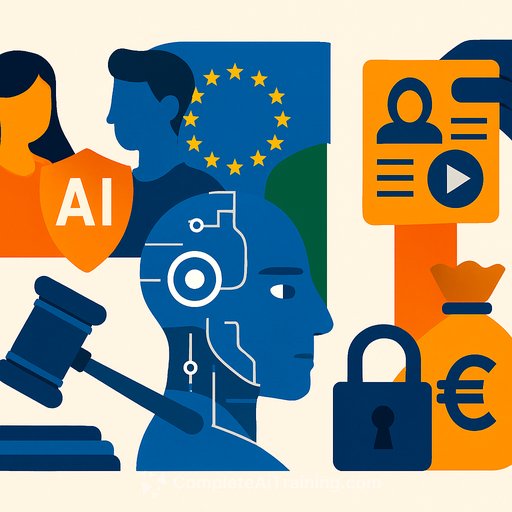Italy Becomes First EU Member With a National AI Law: A Practical Brief for Counsel
Italy has passed the EU's first national AI law following the bloc-wide AI Act. The statute tightens access for minors, adds criminal penalties for AI misuse, sets sector guardrails, clarifies parts of copyright, and funds domestic AI growth. Enforcement will sit with the Agency for Digital Italy and the National Cybersecurity Agency.
Youth Access and Platform Duties
Children under 14 now require parental consent to access AI systems. The measure follows mounting concern over chatbots and minors, including a lawsuit against OpenAI filed by parents of a 16-year-old and findings that Meta's AI chatbots could be steered into explicit role-play with minors, with "romantic or sexual" chats reportedly allowed until recently.
For platforms and publishers, this triggers clear age-gating, consent tracking, and moderation obligations. Expect audits on consent flows, role-play loopholes, and escalation paths for risky interactions.
Criminal Liability for AI Misuse
- Prison sentences of one to five years for misuse, including spreading deepfakes.
- Harsher penalties where AI is used to commit identity theft or fraud.
- Legal teams should update incident response, takedown, and evidence preservation playbooks to address AI-generated content.
Sector-Specific Safeguards
- Healthcare: AI may assist, but physicians must make final clinical decisions.
- Judiciary: Judges are prohibited from outsourcing decisions to AI.
- Employment: Employers must inform workers when AI tools are used.
Action: Refresh hospital policies, court-facing guidance, and HR notices. Add explicit human-in-the-loop clauses and disclosure language to internal policies and external engagements.
Copyright and Text/Data Mining
Human-authored works created with AI assistance can be protected if they show intellectual effort. Text and data mining with AI is permitted only for non-copyrighted content or for scientific research.
- Training and TDM: Commercial use of copyrighted corpora will likely require licenses or documented exceptions; inventory training data sources and license terms.
- Authorship: Establish review protocols to evidence human contribution where copyright protection is sought.
- Contracts: Add TDM licensing clauses, indemnities, and disclosure requirements for vendors providing models or datasets.
Funding and Enforcement
The law authorizes up to €1 billion via a state-backed venture capital fund to support AI, cybersecurity, quantum, and telecoms. Counsel advising startups and investors should assess eligibility, state-aid considerations, and IP ownership in financed projects.
Enforcement will be led by the Agency for Digital Italy and the National Cybersecurity Agency. Prepare for supervisory requests on risk classification, documentation, and technical controls aligned with the EU AI Act.
Immediate Actions for Legal Teams
- Age controls: Implement parental consent checks for under-14s, log consent proofs, and close role-play loopholes.
- Employee notices: Issue clear disclosures where AI assists recruiting, monitoring, or productivity tools; update works council materials where applicable.
- Human decision rights: Codify physician and judicial decision boundaries; include sign-offs in workflow tools.
- Deepfake policy: Add prohibitions, monitoring, and rapid takedown procedures; align with criminal exposure analysis.
- Procurement: Require vendors to disclose model sources, TDM practices, risk controls, and minor-safety features; add audit rights.
- IP and datasets: Audit training data, licenses, and opt-outs; maintain records to evidence lawful TDM or research exemptions.
- Cross-border alignment: Map conflicts between Italian rules and other jurisdictions for global model operations; adjust venue, choice-of-law, and data transfer terms.
- Board reporting: Include AI criminal exposure, youth access compliance, and copyright/TDM posture in quarterly risk updates.
Open Questions to Monitor
- How "intellectual effort" will be assessed by courts for AI-assisted works.
- Interaction between national criminal penalties and EU-wide enforcement mechanisms under the AI Act.
- Allocation of liability between model providers, deployers, and employers in mixed-fault events.
- Standards for detecting and preventing explicit role-play with minors across messaging platforms.
Primary Source
For the EU baseline obligations, see the AI Act text on EUR-Lex: EU Artificial Intelligence Act.
Need structured upskilling for legal and compliance teams on AI policy and tooling? Review role-based programs here: AI courses by job.
Your membership also unlocks:






